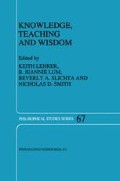Abstract
There is a tradition in philosophy, certainly in the analytic tradition, and perhaps stretching back to antiquity, in which the teaching of philosophy is thought to require a certain form of neutrality. A philosophy teacher should not take it as a goal of the teaching of philosophy that students be converted to any particular philosophical doctrine, or that they be sustained in any of their preexisting opinions. The point of teaching philosophy is not that students should become theists, ethical cognitivists, libertarians, reductive materialists, nor indeed that they adopt any particular philosophical stance. Instead, the successful teacher of philosophy forces students to think critically about a philosophical position and its competitors. I have, at least implicitly, always taken such a thesis of neutrality to be an orthodox and obvious tenet of the philosophy of teaching philosophy. Nonetheless, I have recently found colleagues, particularly those with passionate religious, political or ethical beliefs, who were in less than full agreement with this “received” tradition of philosophical neutrality. I still wish to maintain my orthodoxy, but can no longer expect other philosophers to agree with it unless the position can be adequately articulated and defended. In order to understand what is at issue, and to answer some sophisticated critics of this received tradition, we must become clearer on the epistemic status of philosophical opinion. I would maintain that the neutrality incumbent on the teaching of philosophy is a consequence of a skepticism with respect to philosophy itself.
Access this chapter
Tax calculation will be finalised at checkout
Purchases are for personal use only
Preview
Unable to display preview. Download preview PDF.
Notes
In “Therapeutic Arguments”: Epicurus and Aristotle” in The Norms of Nature,Malcolm Schofield and Gisela Striker, eds., (Cambridge: Cambridge University Press, 1986). I do not, however, maintain that Nussbaum’s view of Epicurus’s teaching is historically accurate.
See George Chatalian’s Epistemology and Skepticism (Carbondale: Southern Illinois University Press, 1991) for a defense of the view that the skepticism of ancient skeptics is quite limited and does not involve the doubting of these claims of common sense.
For example, Paul Churchland, who in Matter and Consciousness (Cambridge, Mass.: Bradford Books, 1984) develops an eliminativist theory of mind.
Socrates: 201CI should make use of premises which the person interrogated would be willing to admit.” Meno, 76d, Benjamin Jowett, tr., ( Indianapolis: Bobbs-Merrill, 1977 ).
A move John Pollock recommends against general skepticism in Contemporary Theories of Knowledge,(Totowa, New Jersey: Rowman & Littlefield, 1986), p. 6.
David Lewis, “Introduction,” Philosophical Papers, vol, I (New York: Oxford University Press, 1983), x.
Peter van Inwagen, in “Quam Dilecta,” in God and the Philosophers,Thomas V. Morris, ed., (New York: Oxford University Press, 1994), considers the facts I make use of in this argument, though he draws back from a skeptical conclusion. He conjectures that what justifies him in accepting a philosophical thesis might be a special sort of insight that is not present in those who disagree with him. Compare my argument to one by Sextus, “So whenever I say ‘To every argument an equal argument is opposed,’ what I am virtually saying is ‘To every argument investigated by me which establishes a point dogmatically, it seems to me there is opposed another argument establishing a point dogmatically, which is equal to the first in respect of credibility and incredibility’; so that the utterance of the phrase is not a piece of dogmatism, but the announcement of a human state of mind which is apparent to the person experiencing it” Sextus Empiricus,4 vols., Loeb Classical Library (Cambridge: Harvard University Press, 1933), book 1 of Outlines of Pyrhonism,p. 203, R. G. Bury, trans., quotation and citation from Chatalian, p. 19.
Though I trust the term “defeater”has an intuitive sense, I am actually using the term here in a way consistent with a technical term of epistemologists. John Pollock, in Contemporary Theories of Knowledge (Totowa, N.J.: Rowman and Littlefield, 1986), p. 38, defines the notion of one proposition or belief defeating another as follows:
In order for us to have a defeater for our philosophical justifications, we must have reason to think that other philosophers are in analogous epistemic situations to ourselves. Thus, if my colleague were suddenly to maintain that he has discovered an argument for solipsism that he thinks cogent and I think mad, I may have reason to think that he is not in an epistemically analogous situation. The situation is akin to a perceptual one. If my colleague were to confuse his wife with a hat, as did the unfortunate man in Oliver Sack’s The Man Who Mistook His Wife for a Hat,(New York: Harper and Row, 1985), I would similarly have good reason to think he is not in an epistemically analogous situation. Yet, if several individuals whom I take to have as good a musical ear as mine were to think they hear the oboes at a point in the symphony where I hear only clarinets, then I would have good reason to doubt my perceptual belief.
Julia Annas “Stoic Epistemology” in Epistemology, Companions to Ancient Thought: 1,Stephen Everson, ed., (Cambridge: Cambridge University Press, 1990), pp. 186–188.
Author information
Authors and Affiliations
Editor information
Editors and Affiliations
Rights and permissions
Copyright information
© 1996 Springer Science+Business Media Dordrecht
About this chapter
Cite this chapter
Ross, G. (1996). Metaphilosophical Skepticism and the Teaching of Philosophy. In: Lehrer, K., Lum, B.J., Slichta, B.A., Smith, N.D. (eds) Knowledge, Teaching and Wisdom. Philosophical Studies Series, vol 67. Springer, Dordrecht. https://doi.org/10.1007/978-94-017-2022-9_19
Download citation
DOI: https://doi.org/10.1007/978-94-017-2022-9_19
Publisher Name: Springer, Dordrecht
Print ISBN: 978-90-481-4684-0
Online ISBN: 978-94-017-2022-9
eBook Packages: Springer Book Archive

